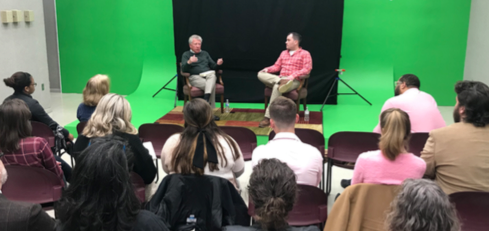Pulitzer prize winner discusses desegregation
March 12, 2020
“It was just another in a long history of racial murders in the Mississippi Delta. But no single event intensified the interest of the Negro press more than the story of the Chicago kid visiting his mother’s uncle in the late summer of 1955 and the trial of the two white men accused of beating him, shooting him in the head, and ditching him in a river with a seventy-pound cotton-gin fan tethered to his neck with barbed wire.”
This is the second sentence in the seventh chapter of Hank Klibanoff and Gene Robert’s Pulitzer Prize winning novel, “The Race Beat.”
Klibanoff, a veteran journalist and professor at Emory University, was invited to the Florence-Lauderdale Public Library on Feb. 27 to speak about his book and record his podcast, “Buried Truths” with a live audience. His co-host for the evening was Sherhonda Allen, a journalist for the Times Daily, who grew up in the Shoals during desegregation.
A group of nearly 50 people were waiting at the library to listen to Klibanoff and the other guest speakers who had come to discuss “The Race Beat”, and to explore the race relations in the Shoals during the Civil Rights era. Klibanoff and Allen discussed how the Shoals area had a “more peaceful” transition into racial desegregation than other southern communities.
Many theories were explored as to why the Shoals had a smoother transition than other parts of Alabama. Klibanoff’s theory was that this occurred because the Tennessee Valley Authority (TVA) had a large part in it. The TVA would have people from not only around the country, but around the world that would come to the Shoals to learn about the nation’s largest electricity supplier.
During the event, Klibanoff shared a personal story of hosting a visitor from an eastern country in his home. This became common throughout the Shoals. His theory was that because the Shoals area was not afraid of sharing their knowledge of TVA with the world, it became a “melting pot of sorts.”
“I think [the library presentation] brought to light some of the things that were going on in the shoals at the time concerning segregation and desegregation of the shoals,” said Patricia Sanders, a professor for Communications at UNA. “I think that Hank has some good stories to share with people. He has good insight on the Civil Rights Movement – what was going on at that time and the news aspect of it, but also to have someone such as himself brings an added wealth and value to the discussion.”
Sanders said that a lot of times a lack of history is being taught about what is going on in the world and in the local community.
“I was a part of the desegregation of schools around late 1969 to 1970 going into the 5th grade, so a lot of the things I am familiar with, but to hear the experiences that people went through surprised me,” Sanders said. “Students need to see where we were and where we’ve come to now, and the importance of protecting that. People can live together in unity and can live with respect and they can love with civility and I think that’s really important and that needs to be continued.”
Klibanoff also came to the University of North Alabama on Feb. 28 to speak and answer any questions that students and faculty might have on Civil Rights in the Shoals.
“This is the kind of event that the Department of Communications has been working on establishing as a regular occurrence here on campus,” said Butler Cain, UNA Department Chair for Communications. “We were really excited to host Mr. Klibanoff in his visit and to be able to bring some of the students into an intimate setting to get to talk to him and learn from his experiences. We are hoping to make this a habit in the department of communication.”
Cain said that the Communications Department wants to hear from experts and people who have a lot of experience in their field particularly in Mass Communications.
“We want to provide them with a forum to speak with our students and share some of their expertise and experiences with them so that our students can become better professionals,” said Cain.


